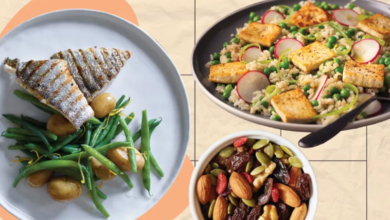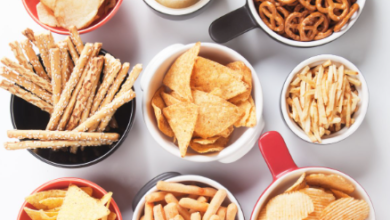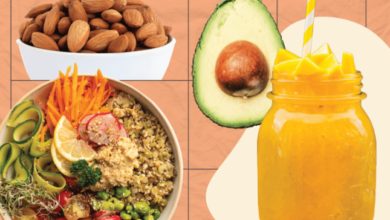7-DAY ANTI-INFLAMMATORY DIET MEAL PLAN
Introduction
Inflammation is a natural response by the body to protect against harm, but chronic inflammation can contribute to various health issues. Adopting an anti-inflammatory diet is a powerful way to support overall health and well-being. This 7-day meal plan provides a guide to delicious and nutrient-dense meals designed to reduce inflammation.
Day 1:
Breakfast
Overnight Chia Seed Pudding
- Ingredients:
- Chia seeds
- Almond milk
- Fresh berries
- Walnuts
- Cinnamon
Lunch
Quinoa Salad with Chickpeas and Veggies
- Ingredients:
- Quinoa
- Chickpeas
- Cherry tomatoes
- Cucumber
- Avocado
- Olive oil and lemon dressing
Dinner
Baked Salmon with Sweet Potato and Broccoli
- Ingredients:
- Wild-caught salmon fillet
- Sweet potatoes
- Broccoli
- Olive oil
- Garlic and herbs
Day 2:
Breakfast
Green Smoothie
- Ingredients:
- Spinach
- Kale
- Pineapple
- Ginger
- Coconut water
Lunch
Mediterranean Chickpea Bowl
- Ingredients:
- Chickpeas
- Kalamata olives
- Cherry tomatoes
- Cucumber
- Feta cheese
- Olive oil and balsamic vinegar
Dinner
Vegetarian Stir-Fry with Tofu
- Ingredients:
- Tofu
- Colorful bell peppers
- Broccoli
- Carrots
- Soy sauce and ginger
Day 3:
Breakfast
Avocado and Tomato Toast
- Ingredients:
- Whole-grain bread
- Avocado
- Tomato slices
- Olive oil
- Basil
Lunch
Lentil and Vegetable Soup
- Ingredients:
- Lentils
- Carrots
- Celery
- Spinach
- Vegetable broth
Dinner
Roasted Brussels sprouts with Quinoa paired with Grilled Chicken
- Ingredients:
- Chicken breast
- Quinoa
- Brussels sprouts
- Olive oil
- Lemon and herbs
Embark on a culinary journey with this exquisite recipe for Baked Salmon and Asparagus. This dish not only delights the taste buds with the richness of salmon but also offers the vibrant freshness of asparagus. Elevate your dining experience by following these simple steps to create a flavorful and nutritious masterpiece.
Day 4:
Breakfast
Berry and Almond Butter Smoothie Bowl
- Ingredients:
- Mixed berries
- Almond butter
- Greek yogurt
- Granola
Lunch
Spinach and Feta Stuffed Turkey Burgers
- Ingredients:
- Ground turkey
- Spinach
- Feta cheese
- Whole-grain buns
- Lettuce and tomato
Dinner
Baked Cod with Asparagus and Quinoa
- Ingredients:
- Cod fillets
- Asparagus
- Quinoa
- Lemon and herbs
Day 5:
Breakfast
Turmeric Oatmeal with Berries
- Ingredients:
- Rolled oats
- Turmeric
- Almond milk
- Mixed berries
- Chopped nuts
Lunch
Roasted Vegetable and Hummus Wrap
- Ingredients:
- Whole-grain wrap
- Roasted vegetables (zucchini, bell peppers, eggplant)
- Hummus
- Spinach
Dinner
Shrimp and Vegetable Stir-Fry with Brown Rice
- Ingredients:
- Shrimp
- Mixed vegetables (broccoli, bell peppers, snap peas)
- Brown rice
- Soy sauce and garlic
Day 6:
Breakfast
Coconut and Mango Chia Pudding
- Ingredients:
- Chia seeds
- Coconut milk
- Mango chunks
- Shredded coconut
Lunch
Quinoa and Black Bean Bowl
- Ingredients:
- Quinoa
- Black beans
- Corn
- Avocado
- Lime dressing
Dinner
Salmon and Avocado Salad
- Ingredients:
- Grilled salmon
- Mixed greens
- Avocado
- Cherry tomatoes
- Olive oil and balsamic vinegar
Day 7:
Breakfast
Peanut Butter Banana Smoothie
- Ingredients:
- Banana
- Peanut butter
- Almond milk
- Greek yogurt
Lunch
Caprese Salad with Grilled Chicken
- Ingredients:
- Grilled chicken breast
- Fresh mozzarella
- Tomato slices
- Basil leaves
- Balsamic glaze
Dinner
Vegetarian Cauliflower and Chickpea Curry
- Ingredients:
- Cauliflower
- Chickpeas
- Coconut milk
- Curry spices
- Brown rice
Additional Tips:
- Hydration:
- Stay well-hydrated throughout the day by drinking water, herbal teas, and infused water with lemon or cucumber.
- Snacking:
- Choose healthy snacks like raw nuts, seeds, fresh fruit, or vegetable sticks with hummus.
- Limit Processed Foods:
- Minimize processed foods, refined sugars, and artificial additives to reduce inflammation.
- Mindful Eating:
- Savor each bite and be aware of your body’s signals of hunger and fullness to engage in mindful eating.
- Consult a Professional:
- For individualized guidance, speak with a medical expert or a certified dietitian if you have any particular dietary concerns or medical issues.
- Herbal Teas:
- Include anti-inflammatory herbal teas such as ginger tea, turmeric tea, or chamomile tea in your daily routine. These beverages can provide additional anti-inflammatory benefits.
- Omega-3 Fatty Acids:
- Increase your intake of omega-3 fatty acids, found in fatty fish (like salmon and mackerel), chia seeds, flaxseeds, and walnuts. Omega-3s have potent anti-inflammatory properties.
- Colorful Variety:
- Embrace a colorful variety of fruits and vegetables. Different colors signify diverse phytonutrients, each offering unique anti-inflammatory compounds.
- Spice it Up:
- Incorporate anti-inflammatory spices like turmeric, ginger, cinnamon, and cayenne pepper into your meals. These spices not only add flavor but also contribute to inflammation reduction.
- Probiotic-Rich Foods:
- Consume foods high in probiotics, such as kimchi, kefir, sauerkraut, and yogurt. A healthy gut microbiome is linked to reduced inflammation.
- Alkaline Foods:
- Consume alkaline foods like leafy greens, cucumber, and celery. Alkaline diets are believed to help maintain the body’s pH balance and reduce inflammation.
- Green Leafy Vegetables:
- Prioritize green leafy vegetables like kale, spinach, and Swiss chard. These vegetables are rich in antioxidants and have anti-inflammatory properties.
- Mindful Eating Practices:
- Practice mindful eating by sitting down without distractions, chewing food slowly, and savoring each bite. Mindful eating can positively impact digestion and nutrient absorption.
- Limit Added Sugars:
- Reduce your intake of added sugars, as they can contribute to inflammation. Choose natural sweeteners sparingly, such as honey or maple syrup.
- Healthy Cooking Oils:
- Choose healthy cooking oils such as extra virgin olive oil, avocado oil, or coconut oil. These oils contain monounsaturated fats and have anti-inflammatory effects.
Adopting an anti-inflammatory diet is a holistic approach to promoting overall health and well-being. By incorporating a variety of nutrient-dense foods, you provide your body with essential vitamins, minerals, and antioxidants that support its natural anti-inflammatory processes. Experiment with different recipes, flavors, and ingredients to make your anti-inflammatory journey enjoyable and sustainable.






